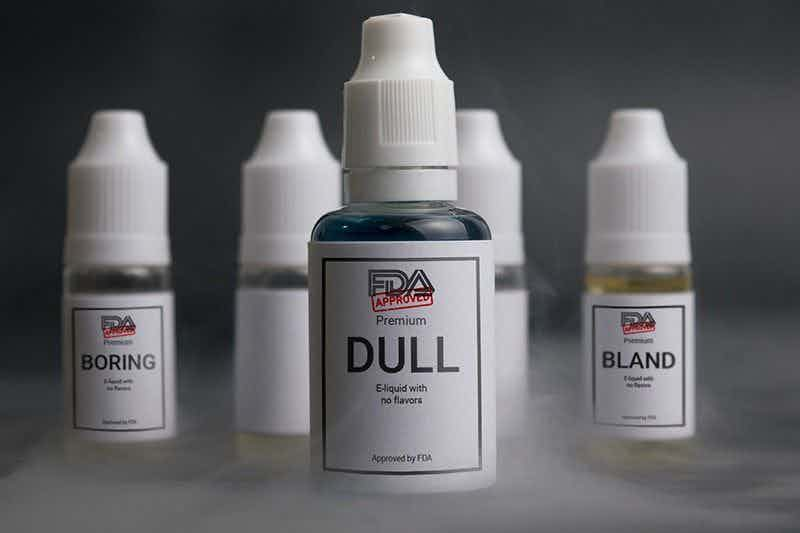Nearly four months after announcing it, the FDA has finally issued guidance on the sale of flavored vape products, including e-liquid and devices like disposable e-cigs. The new guidance could be the last vaping-related policy decision by Commissioner Scott Gottlieb, who recently announced his resignation. The FDA announced yesterday that NCI director Ned Sharpless will take over as acting commissioner in April.
“We’re proposing to prioritize enforcement of flavored ENDS products (other than tobacco-, mint-, and menthol-flavored) that are offered for sale in ways that pose a greater risk for minors to access the products,” Gottlieb said in a statement. “For instance, we’ll consider whether the products are sold under circumstances, whether at retail or online, without heightened age verification.”
The big news is that the agency has moved up the deadline by one year for manufacturers to submit premarket tobacco applications (PMTA’s) for flavored products other than tobacco, mint and menthol — from Aug. 8, 2022 to Aug. 8, 2021. In 2017, Gottlieb postponed the application deadline from 2018 to 2022.
Since the FDA has still not produced promised standards-based regulations for small manufacturers like e-liquid makers, this could amount to a death sentence for any vaping business that depends on sales of flavored e-liquid. Currently, producing a PMTA requires a manufacturer to spend probably $1 million per product with no guarantee it will be approved. No vaping company has yet submitted an application.
Most of the new requirements were part of Gottlieb’s November guidance announcement. Other components of the new guidance include:
The FDA has already targeted e-liquid brands that use so-called kid-appealing packaging, like labels and boxes that copy candies and fruit drinks. The announcement today seems to indicate further enforcement against such practices.
Forcing flavored products into stores that prohibit entry to minors means that convenience stores will be unable to sell flavored vaping products (other than tobacco, mint and menthol), but will still be allowed to sell cigarettes, beer, liquor, and pornography. Retail trade associations have already announced that they may go to court to challenge the FDA policy.
The FDA guidance document doesn’t mandate specific quantity restrictions, although the final guidance (issued after public comment) might be more specific. Many retailers already have self-imposed limits on the number of refills or pods sold per day.
Gottlieb says that online sellers should be using “independent, third-party, age- and identity-verification services that compare customer information against third-party data sources, such as public records.” These are services that many online vaping retailers already use.
The FDA guidance document is long and repetitive, but the evidence it contains to support flavor restrictions is weak. The agency claims that it has the proof that flavored vaping products (other than tobacco, mint and menthol) are uniquely attractive to minors and not important to adults. But the studies cited are old and limited (including a 2014 survey of fewer than 400 Connecticut high school students), and the agency ignored last year’s national survey of almost 70,000 adult vapers that clearly shows that successful ex-smoking vapers prefer fruit and dessert flavors.
The actions didn’t satisfy staunch foes of vaping. “This will fail to solve the e-cigarette epidemic,” a spokesperson for the American Lung Association told the Washington Post. “The FDA is continuing to kick the can down the road rather than doing what it will ultimately take to end this epidemic — removing all flavored tobacco products from the market.”
“A public health crisis of this magnitude demands faster and more forceful action than the steps announced by the FDA,” added Matthew Myers of Campaign for Tobacco-Free Kids. Myers and others are pushing for Congressional action.
The moral panic over youth vaping — fanned by Commissioner Gottlieb’s proclamation of an “epidemic” — has led to incredible pressure to ban vape flavors from tobacco control groups like TFK. The 2021 PMTA deadline may not matter if those activists have their way. There have been flavor ban bills introduced recently in both the U.S. House and Senate.
After rumors that Gottlieb had been forced to resign because the Trump administration wanted a more industry friendly FDA commissioner, both the White House and Gottlieb are making a big show of being on the same page. Special Assistant to the President Judd Deere released a supportive statement, and Gottlieb’s announcement included, “with the strong support of the Secretary of Health and Human Services Alex M. Azar, and President Donald J. Trump….”
The White House seems to be rubbing its support of the outgoing commissioner in the face of conservative activists who called for his firing and then implied that their influence had led to Gottlieb’s dismissal. Clearly, President Trump agrees that vapers, the vaping industry, and its supporters carry no weight in his administration, and that reducing regulations is only a goal in federal agencies other than the FDA.
The FDA will accept public comment for 30 days on the draft guidance, and it will go into effect 30 days after the final guidance is issued.

Jim McDonald
Vaping for: 13 years
Favorite products:
Favorite flavors: RY4-style tobaccos, fruits
Expertise in: Political and legal challenges, tobacco control haters, moral panics
Jim McDonald
Smokers created vaping for themselves without help from the tobacco industry or anti-tobacco crusaders, and I believe vapers and the vaping industry have the right to continue innovating to give everyone who wants to use nicotine access to safe and attractive non-combustible options. My goal is to provide clear, honest information about vaping and the challenges nicotine consumers face from lawmakers, regulators, and brokers of disinformation. You can find me on Twitter @whycherrywhy


